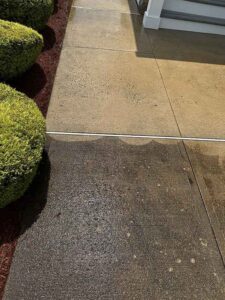Pressure Washing vs. Soft Washing: What’s the Difference?
Keeping your home’s exterior clean is more than just about looks, it’s about maintaining the structural integrity and value of your property. If you’re a homeowner in New Jersey, you might be pondering the best method for cleaning those dingy surfaces. Should you go with pressure washing or soft washing? Let’s break it down.
Understanding the Importance of Exterior Cleaning
With its mix of humid summers and brisk winters, New Jersey’s climate can wreak havoc on your home’s exterior. Mold, mildew, algae, and grime — which are all byproducts of a diverse climate — don’t just look unattractive, they can also cause damage over time. As a result, regular cleaning is essential to prevent this buildup and preserve the longevity of your surfaces. But what’s the best approach?
The Basics of Pressure Washing

This type of washing involves using high-pressure water to blast away dirt, grime, and other contaminants from surfaces. The strong jet of water can remove even the most stubborn stains, making it a popular choice for tough jobs. It’s effective for cleaning hard surfaces like driveways, sidewalks, and brick walls — though it can be too powerful for certain scenarios.
It’s important to note: high-velocity water streams can be too harsh for your home’s exterior — leading to potential wear, tear, and erosion of surfaces.
- Ideal Surfaces: A pressure wash is perfect for concrete, stone, and metal surfaces.
- How It Works: The machine uses a motor to pump water at high pressure through a nozzle.
- Effectiveness: It’s highly effective for removing heavy dirt and stubborn grime.
The Advantages of Soft Washing
Soft washing — a T. Whitaker specialty — uses a low-pressure nozzle combined with specialized cleaning solutions to safely clean surfaces. This method is ideal for delicate surfaces that could be damaged by high pressure. Moreover, with moss, bacteria, and microorganisms galore, soft washing presents the perfect opportunity to clean your home and protect your loved ones without doing any damage to your property.
- Ideal Surfaces: Soft washing is best for siding and wooden decks.
- How It Works: It uses biodegradable chemicals to break down dirt and kill mold and algae at the root.
- Effectiveness: It’s particularly effective for treating and preventing organic growth like algae and mold.
Key Differences Between Pressure and Soft Washing
- Pressure and Techniques:
- Pressure washing uses high pressure, which is ideal for hard surfaces but can damage softer ones.
- Soft washing employs low pressure, making it safer for delicate surfaces.
- Effectiveness for Various Surfaces:
- A pressure wash is excellent for removing surface-level dirt but may not address deep-rooted mold or algae.
- Soft washing provides a deeper clean by targeting the root of the problem, making it more effective for organic growth.
Factors to Consider for Choosing the Right Method
- Surface Material:
- For pavers and brick, choose soft washing. A pressure wash can damage the mortar joints between bricks and can also blast the sand out of pavers.
- For roofs, siding, and wood, soft washing is more suitable.
- Type of Dirt or Mold:
- Heavy dirt and grime respond well to pressure washing — though soft washing blasts these contaminants away as well.
- Mold and algae are better treated with soft washing.
- Climate Considerations in New Jersey:
- With its humid summers, New Jersey homes often face mold and algae issues, making soft washing a favorable option for many.
Soft Washing with T. Whitaker
For New Jersey homeowners, choosing between pressure and soft washing comes down to the type of surfaces and the kind of dirt or mold you’re dealing with. Pressure washing is great for hard, dirty surfaces, while soft washing is better for delicate areas with mold or algae.
At T. Whitaker, we have the expertise and resources to clean your home’s exterior with care and precision. With access to commercial-grade equipment and cleaning equipment, our soft washing technique is gentle yet effective, ensuring a thorough clean without causing any damage to your property. To get started with the soft washing process, please visit T. Whitaker Painting’s website and give us a call at 609-758-2324!
